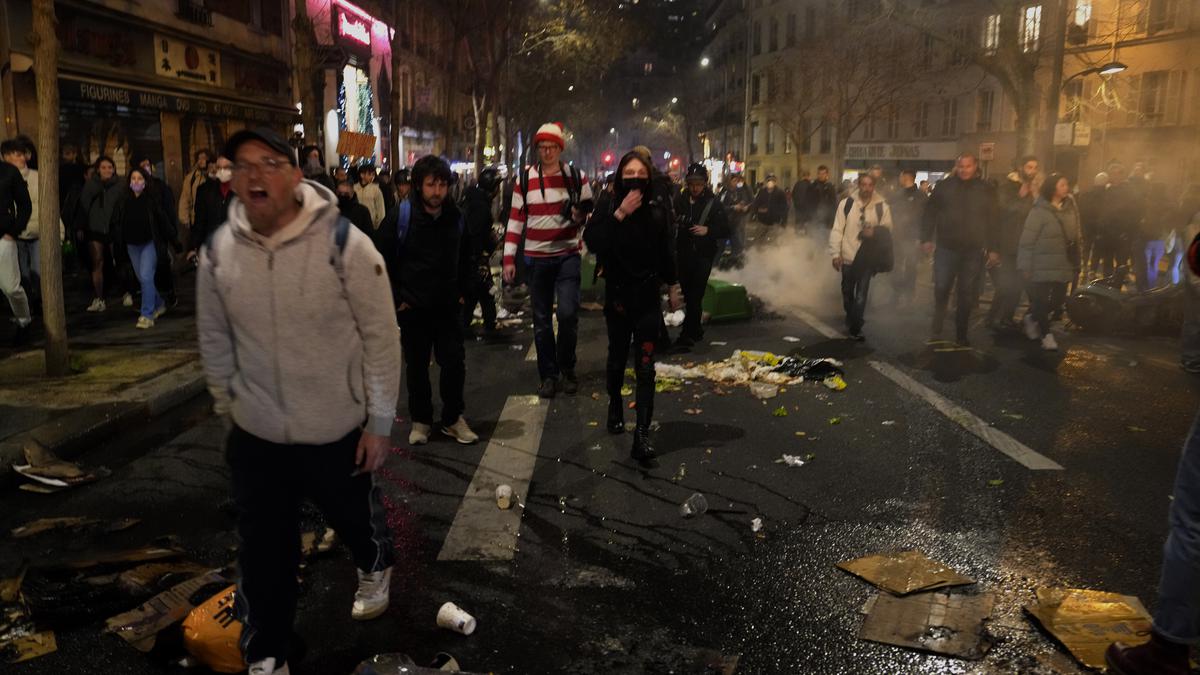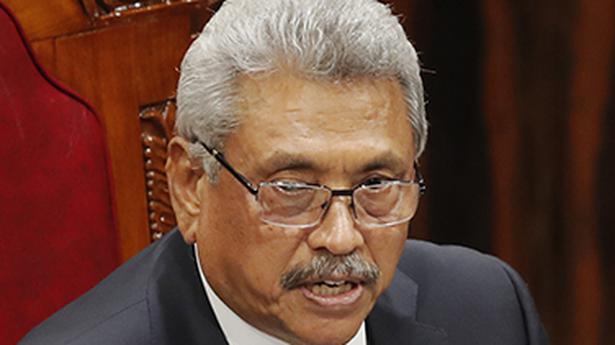A protesters shout slogans during a protest in Paris, on March 18, 2023. A spattering of protests were planned to continue in France over the weekend against President Macron’s controversial pension reform, as garbage continued to reek in the streets of Paris and beyond owing to continuing action by refuse collectors.
| Photo Credit: AP
A smattering of protests against President Emmanuel Macron’s plan to raise France’s retirement age from 62 to 64 took place on March 18 in Paris and beyond, as uncollected garbage reeked in the streets of the French capital amid a strike by sanitation workers.
Largely non-violent protests were held in various cities, including Nantes and Marseille, where protesters got past police to occupy the main train station for around 15 minutes. In the eastern city of Besancon, hundreds of demonstrators lit a brazier and burned voter cards.
In Paris, police sought to restore calm after two consecutive nights of unrest. Police banned gatherings on the Champs-Elysées avenue and the elegant Place de la Concorde, where protesters tossed an effigy of Mr. Macron into a bonfire as a crowd cheered Friday night.
Several thousand protesters gathered Saturday evening at a public square in southern Paris, the Place d’Italie, then marched toward Europe’s biggest waste incineration plant, which has become a flashpoint of tensions. Some set trash cans on fire, and protesters chanted mottos such as “the streets are ours” as firefighter sirens wailed.
Protesters are trying to pressure lawmakers to bring down Mr. Macron’s government and doom the unpopular retirement age increase he’s trying to impose without a vote in the National Assembly.
After Mr Macron ordered Prime Minister Elisabeth Borne to invoke a special constitutional power to skirt a vote in the chaotic lower chamber, lawmakers on the right and left filed no-confidence motions against her Cabinet on Friday. The motions are expected to be voted on Monday.
Some Paris residents who were out buying their weekend baguettes blamed Mr. Macron’s administration for the fumes wafting from the trash piled up near a bakery in the city’s 12th district.
“The government should change its position and listen to the people because what is happening is extremely serious. And we are seeing a radicalization,” Isabelle Vergriette, 64, a psychologist, said. “The government is largely responsible for this.”
The district’s mayor, Emmanuelle Pierre-Marie, was out and about from the crack of dawn voicing concern in her neighborhood about the consequences of the uncollected garbage, which has become a visual and olfactory symbol of the actions to defeat the President’s pension reform plan.
“Food waste is our priority because it is what brings pests to the surface,” Pierre-Marie said. “We are extremely sensitive to the situation. As soon as we have a dumpster truck available, we give priority to the places most concerned, like food markets.”
Police have requisitioned garbage workers to clean up some neighborhoods, but heaps of refuse remain.
More labor strikes were planned for Monday in numerous sectors, from transportation to energy. The Civil Aviation authority asked to have 30% of flights canceled at Orly, Paris’ second airport, and 20% in Marseille.
Trade union confederation CGT warned that at least two oil refineries might be shut down starting Monday. Industry Minister Roland Lescure said the government could requisition personnel — order workers back to their posts — to avoid fuel shortages.
At Saturday’s protest, Melodie Tunc, 22, said Mr. Macron passing the bill without a vote was the last straw. Marching carefully to avoid garbage piled up on Paris streets, she said, “It is a good thing that garbage in the streets is so visible. It tells people how garbage collectors are so useful.”
“The government used force to pass its bill. But we have to fight for our social achievements and the only way to do it is to take to the streets,” she said.
Mr. Macron has argued that requiring people in France to work two more years is needed to invigorate the country’s economy and to prevent its pension system from falling into a deficit as the population ages.
Laurent Berger, head of the moderate CFDT union, said the retirement reform “must be withdrawn.”
“We condemn violence. … But look at the anger. It’s very strong, even among our ranks,” he said on RMC radio.





